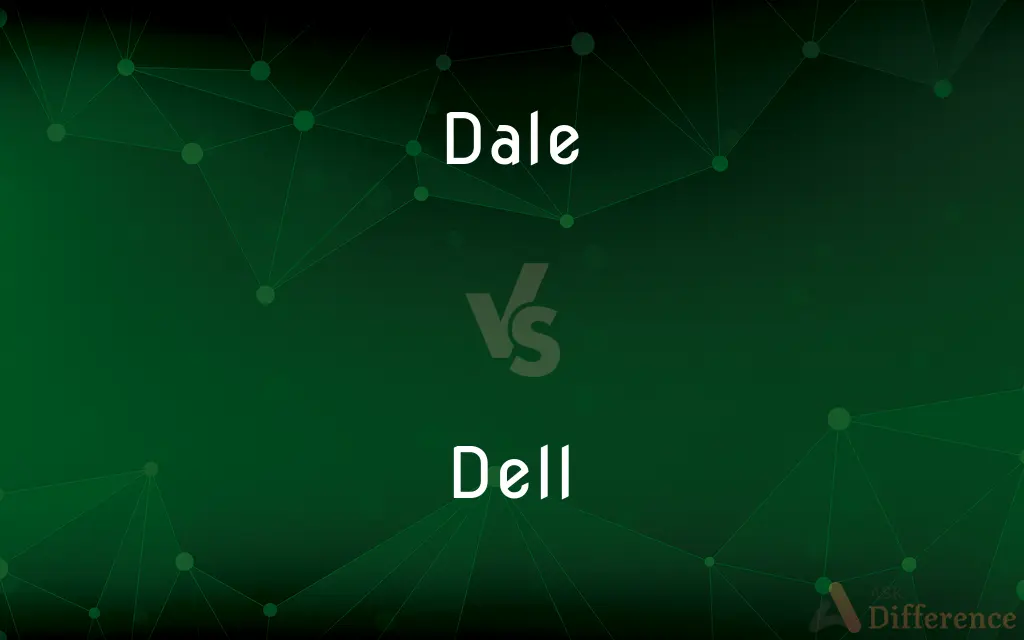Dale vs. Dell — What's the Difference?
By Tayyaba Rehman — Updated on October 5, 2023
"Dale" refers to a broad valley. "Dell" is a small, secluded, often wooded valley. Both denote types of valleys but differ in size and often in topographical context.

Difference Between Dale and Dell
Table of Contents
ADVERTISEMENT
Key Differences
Dale" and "Dell" both articulate geographical features but elicit images of different scopes and settings. A dale conveys a broad, open valley, often among hills or mountains. Conversely, a dell introduces a thought of a small, often wooded and hidden valley, typically quite lush and perhaps containing a stream.
Where "Dale" can often be expansive and accommodating to settlements or agricultural uses due to its wider spread, "Dell" refers to a more intimate and potentially untouched natural space, a nook within the larger expanse of nature, likely less suited to widespread human use.
"Dale" may be encountered in a variety of geographical contexts, potentially serving as home to various forms of wildlife and vegetation. In contrast, "Dell" implies a sheltered, serene spot, possibly a habitat to specific woodland creatures and diverse, possibly dense vegetation due to potential access to a consistent water source.
Considering etymology, "Dale" comes from Old English "dael," relating to modern English "deal," indicating a part or division; it inherently suggests space. "Dell" originates from Old English "delle," signaling a delving or a hollow, embodying seclusion and containment.
In literature and speech, "Dale" might be used to depict larger, more socially active environments or spaces where events unfold over a wider area. "Dell," on the other hand, might be used to articulate scenes of solitude, secret meetings, or hidden activities due to its connotations of smallness and seclusion.
ADVERTISEMENT
Comparison Chart
Size & Scope
Broad and open valley.
Small, secluded valley.
Typical Use
More suitable for human activities like farming.
Less suitable for widespread human use.
Connotation
Can imply a larger, social, or inhabited space.
Suggests solitude and untouched nature.
Wildlife & Vegetation
Potentially diverse and expansive.
Likely dense, lush, and specific to a small ecosystem.
Literary/Conversational Usage
May depict wider, social environments or broad landscapes.
Used to depict small, hidden, or intimate natural scenes.
Compare with Definitions
Dale
A "Dale" is a wide, open valley.
The town was nestled comfortably in the heart of the dale.
Dell
"Dell" might imply a small ecosystem and a sense of containment.
The dell, lush and green, housed a babbling brook.
Dale
In a literary context, a "Dale" may also symbolize open, shared spaces.
The army marched triumphantly across the dale.
Dell
"Dell" usually signifies an area surrounded by trees or hills.
Birds chirped melodiously in the peaceful dell.
Dale
"Dale" can also signify a specific geographic region, notably in Northern England.
The Yorkshire Dales are known for their scenic beauty.
Dell
In literature, a "Dell" may symbolize isolation or hidden activities.
The outlaws convened in a secret dell to discuss their plans.
Dale
"Dale" often encompasses a larger ecosystem and potential human interaction.
Farms dotted the fertile dale, yielding plentiful crops.
Dell
A "Dell" is a small, secluded valley.
We discovered a hidden dell in the heart of the forest.
Dale
A valley, especially in northern England.
Dell
"Dell" often suggests a place of tranquility and natural beauty.
The dell, filled with wildflowers, was a perfect picnic spot.
Dale
A valley
Galloped over hill and dale.
Dell
Dell is an American multinational computer technology company that develops, sells, repairs, and supports computers and related products and services, and is owned by its parent company of Dell Technologies. Founded in 1984 by Michael Dell, the company is one of the largest technology corporations in the world, employing more than 165,000 people in the U.S. and around the world.Dell sells personal computers (PCs), servers, data storage devices, network switches, software, computer peripherals, HDTVs, cameras, printers, and electronics built by other manufacturers.
Dale
A valley, often in an otherwise hilly area.
Dell
A small secluded wooded valley.
Dale
The sunken or grooved portion of the surface of a vinyl record.
Dell
A valley, especially in the form of a natural hollow, small and deep.
Dale
(archaic) A trough or spout to carry off water, as from a pump.
Dell
(obsolete) A young woman; a wench.
Dale
A low place between hills; a vale or valley.
Where mountaines rise, umbrageous dales descend.
Dell
A small, retired valley; a ravine.
In dells and dales, concealed from human sight.
Dale
A trough or spout to carry off water, as from a pump.
Dell
A young woman; a wench.
Sweet doxies and dells.
Dale
An open river valley (in a hilly area)
Dell
A small wooded hollow
Dale
"Dale" might imply an expansiveness and suitability for activities.
We spent the day exploring the peaceful dale.
Common Curiosities
How does a "Dale" typically appear in literature or speech?
A "Dale" can represent broad, shared, or inhabited landscapes.
How is a "Dell" commonly used in conversation or writing?
A "Dell" might symbolize hidden, intimate, or solitary natural scenes.
What is a "Dale"?
A dale is a broad, open valley.
Can "Dale" and "Dell" be used interchangeably?
While both refer to valleys, their usage can differ due to their size and connotation implications.
Are both "Dale" and "Dell" commonly used in everyday speech?
While recognized, they may not be frequently used in casual conversation, depending on the region.
Are there famous instances in literature where "Dale" is used?
Yes, "Dale" appears in various literature, including locations like “The Shire” in J.R.R. Tolkien’s works.
What is a "Dell"?
A dell is a small, secluded, often wooded valley.
Does "Dale" generally refer to an inhabited area?
Not necessarily, but "Dale" may often be large enough to accommodate settlements.
Can "Dell" refer to a valley of any size?
Typically, no. "Dell" refers specifically to a small, secluded valley.
Can "Dale" also refer to a small valley?
While possible, "Dale" often conveys a sense of a larger, open area.
Does a "Dale" usually depict a peaceful and tranquil setting?
Not necessarily; "Dale" doesn’t inherently convey tranquility, as it might be inhabited or utilized for activities.
How should I decide whether to use "Dale" or "Dell" when writing?
Consider the size, seclusion, and contextual implications you wish to convey: "Dale" for larger, open valleys and "Dell" for smaller, secluded ones.
Is "Dell" more likely to be used in a poetic or literary context?
Yes, "Dell" is often used in literary contexts to convey seclusion or natural beauty.
Are there specific geographic regions referred to as a "Dell"?
While "Dell" can be used in proper nouns for places, it’s not as commonly used to name specific geographic regions.
Can a "Dell" be devoid of vegetation?
It's possible, but "Dells" are often depicted as lush and verdant in literature and common usage.
Share Your Discovery

Previous Comparison
Cigarette vs. Dart
Next Comparison
Game vs. MatchAuthor Spotlight
Written by
Tayyaba RehmanTayyaba Rehman is a distinguished writer, currently serving as a primary contributor to askdifference.com. As a researcher in semantics and etymology, Tayyaba's passion for the complexity of languages and their distinctions has found a perfect home on the platform. Tayyaba delves into the intricacies of language, distinguishing between commonly confused words and phrases, thereby providing clarity for readers worldwide.














































